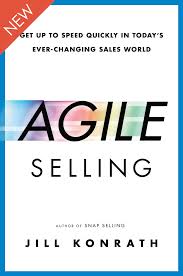I started reading Agile Selling the weekend before I left for my first Sales Shebang event. The shorter of Jill's books, it was informative and enjoyable to read.
As I sat next to my husband at the lake and read certain parts out loud to him exclaiming, "Who does that sound like to you?!?", I would laugh when he asked who got inside my head. Here is what I loved about Jill's latest book and what I took away from it.
What does it mean to be a faster learner in sales?
 Jill is a well known and accomplished sales person, trainer, consultant and speaker, but in her book she shares her stories of doubts, fears, and struggles and how she got through them by developing a personal process of agile learning.
Jill is a well known and accomplished sales person, trainer, consultant and speaker, but in her book she shares her stories of doubts, fears, and struggles and how she got through them by developing a personal process of agile learning.
How to get up to speed quickly in an ever changing world is something that should be on every sales person's mind. Buyer expectations have changed (thank you Internet!), and sellers need to provide more value than Google. The answers lies in understanding what value means to the buyer. (For example, a follow up email that says I just wanted to check in with you provides no value to anyone really.)
Being an agile seller also means having the ability to break down and digest large amounts of information quickly. I would often call this process 'eating an elephant' by breaking up the elephant of information into smaller bite sized pieces.
"...four is the maximum number of chunks our brains can optimally process..."
"Understanding who you're selling to is far more important than what you're selling!"
The other reason I read it is because I believe that, "how we sell is more important then what we sell. It's totally within our power to become the person whom our prospects choose to buy from." The catch is that if you are not able to think from someone else's perspective (empathy) you will never really be able to improve how you sell. In order to rise above the fast, complex, and ever changing information, you have to have a process for breaking down and organizing information.
Perhaps this is why I have been a student and practitioner of using buyer persona profiles? The twist is that all this time I had been thinking of buyer persona profiles as a job for marketing to get sales to be involved with (driven by marketing). But perhaps it should really be driven by sales as something they give to marketing (not vice-versa) as a tool to align their messaging and content.
After all, who is closer to the buyer? Or as Jill writes, perhaps there will be less "self-serving pabulum from marketing that touts how great your stuff is...obligatory puffery and tired buzzwords (for example "passion for excellence", "state-of-the-art") that marketers feel compelled to use."
Status quo is your biggest competitor.
Change is hard. People don't want to change or get pushed anywhere outside of their comfort zones. When you have overwhelmed buyers trying to keep up with the changes in their own industries and the rapid pace of technology, many opt for not making a decision at all. Sales people need to learn not just everything about their competition, their products, but they also need to understand the buying journey and be able to get to the motivating reason of why change, why now, and what happens if nothing changes. Taking information into smaller pieces is the only way (I know of) to understand and manage change.
"The truth is, the status quo is your biggest competitor. Your prospects don't want to change how they're doing things. It takes time and energy they don't have. Don't forget, their brains are overloaded too."
Plan, practice, adjust your attitude and repeat.
I am never comfortable with "winging it". I am just not that charming. What I loved about my own sales coaching was the accountability I needed to plan and prepare for my calls and then role play them with my group of peers. I always felt much more confident going into the meeting. It didn't always go as planned or practiced, but the preparation is where I learned to be agile so that if it didn't go as planned, I could adjust as needed without being totally thrown off.
Lastly, there are some who would contend that sales people are only motivated by their commission. Jill points out that according to author Daniel Pink, "The science shows that the secret to high performance isn't our reward-and-punishment drive, but our third drive- our deep-seated desire to direct our own lives, to expand and extend our abilities, and to live a life of purpose." As Lisa Early McLeod wrote in Selling with Noble Purpose:
"Salespeople who sell with noble purpose- who want to make a difference to customers-outsell salespeople who focus on sales goals and money."
I highly recommend buying, reading, and sharing Jill's book "Agile Selling" if you are a sales person trying to get up to speed quickly (and you should be!)






